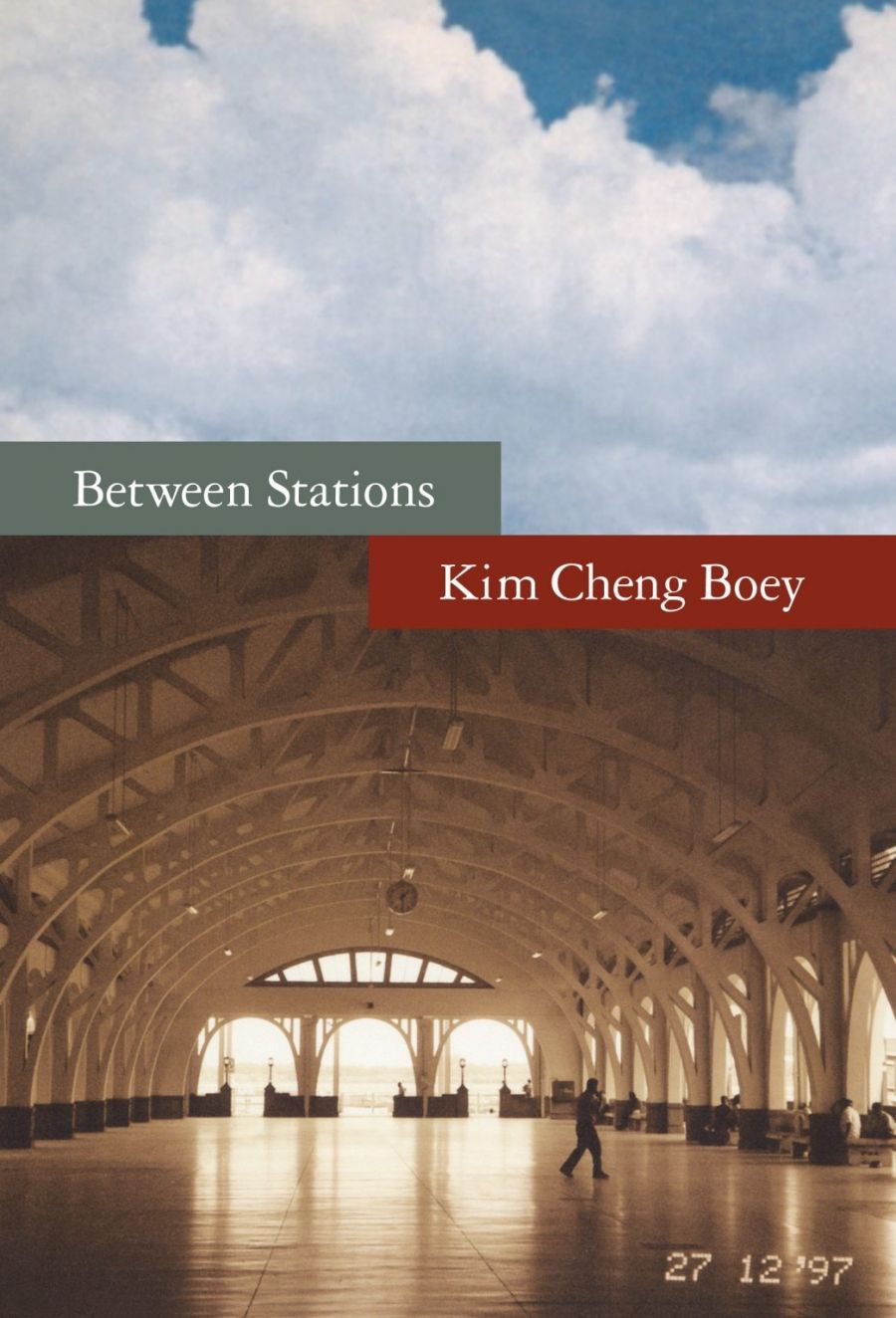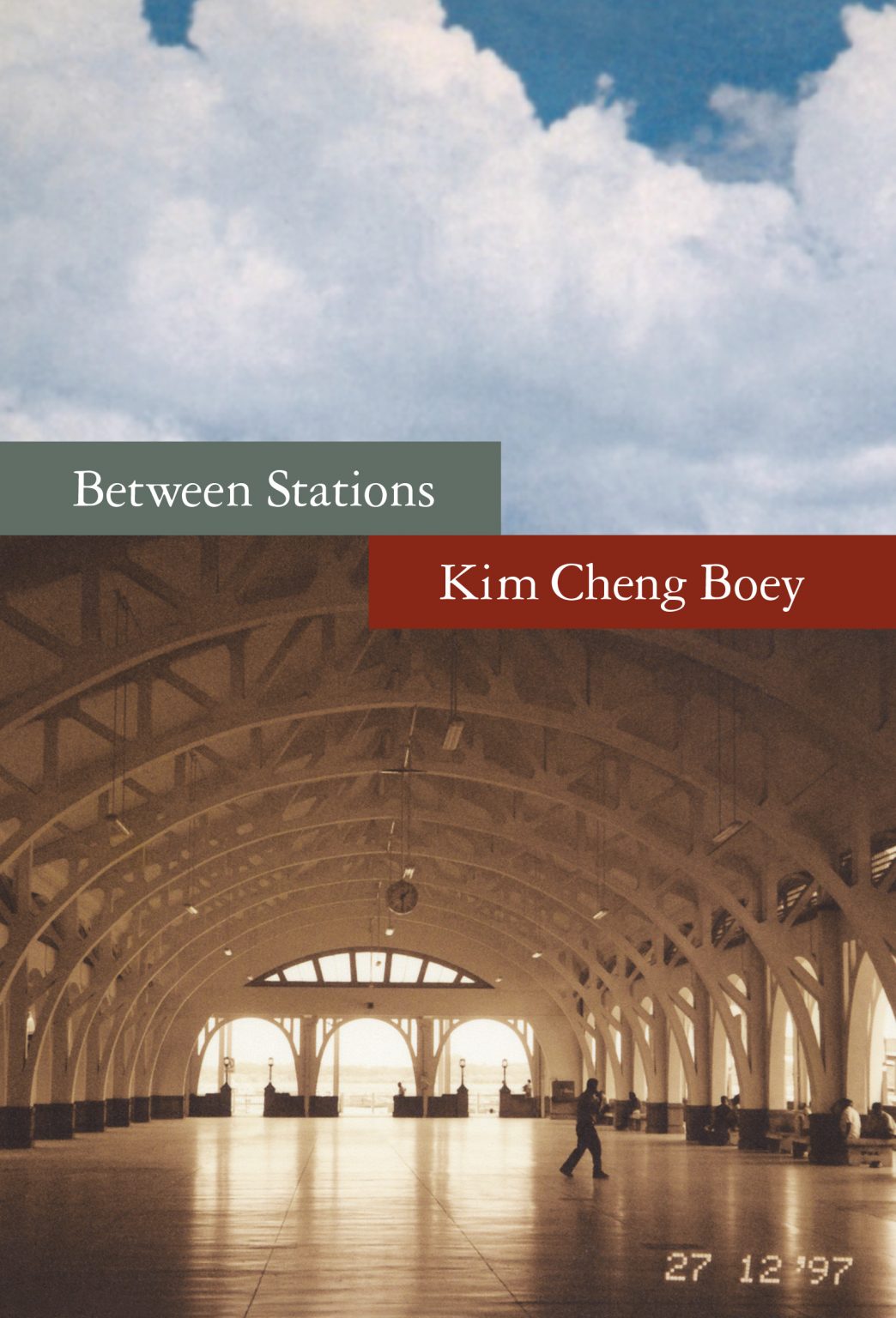
- Free Article: No
- Contents Category: Travel
- Review Article: Yes
- Article Title: Arched station
- Online Only: No
- Custom Highlight Text:
The migration process makes you adept, Kim Cheng Boey remarks, in coded language. The first poem he wrote after settling in Sydney recalls an exhibition in the Queen Victoria Building about the Chinese tea entrepreneur Mei Quong Tart, whose clan name is the same as the Boey family’s. His daughter, pointing with her small finger, decodes the character mei, meaning ‘nothing’, a negative prefix that also signifies bad luck.
- Book 1 Title: Between Stations
- Book 1 Biblio: Giramondo, $27.95 pb, 320 pp
- Book 1 Cover Small (400 x 600):

Boey has migrated to a migrant nation and from a migrant nation. Since settling in Australia in 1997, he says he has flattened his BBC accent, but on visits back to Singapore he reverts to Singlish. Born Boey Kim Cheng, in Singapore, he has several times rearranged his name. He first published poetry and essays in English as K.C. Boey. He then became Kim Boey in Berowra, in order to fit in and make friends. Later, to avoid being mistaken for a Korean, he reverted for a while to his original Singaporean name. Now he is Kim Cheng Boey.
Between Stations, whose cover photograph depicts an arched railway station, was first intended to record the year Boey spent travelling in China, Nepal, India, Egypt and Morocco to prepare himself for migration to Australia. Instead, it became a set of essays on leaving and return, waiting and arrival, recollection and loss, friendship and kinship. And on the barbed wire of this no man’s land, he keeps encountering memories of his father’s life and death.
Boey now teaches creative writing at the University of Newcastle, and the topics of some of the essays – on walking, on the sense of smell and on waiting, for example – seem like subjects he might have set for his class. One is even called ‘My Best Friend’. Liberally adorned with quotations from Cervantes, Thoreau, Lowell, Sontag, Barthes, Kafka and Chatwin, Boey’s prose is often poetic, while his poems included here read more like prose. He nostalgically recalls his formative cultural experiences in Singapore’s British Council Library, including screenings of Olivier’s Hamlet, Pinter’s The Caretaker and David Lean’s Oliver Twist. There, he eclectically explored Mahler and Elgar, the Romantics, and the poetry and prose of Edward Thomas. (The British, and others, have long known that culture makes converts for life, and that a civilised nation narrates itself to the world: something of which it is perplexingly hard to convince Australian leaders.)
But the building that housed the British Council, Rubber House, fell victim to Singapore’s rebuilding mania, as did another of Boey’s favourite haunts, the neighbouring Change Alley, where he caught his ‘first whiff of abroad’, hearing foreign words and accents. The Alley’s name, imported from London, was transliterated as Chin Jia Li in the Hokkien of uneducated Chinese like Boey’s grandmother, before that dialect too was bulldozed by Singapore’s ‘Use Mandarin’ campaign. Boey deplores this loss, and tries to ‘keep the nostalgia up’. The prevailing view is that Singapore cannot live in its village past; but Boey is not at home in the high-rise present, with its ‘thick sonic gauze’ of traffic, television, karaoke, mah-jong and quarrels. He has graduated, done military service and tried various community jobs, but his own quarrel with Singapore and with himself is unresolved.
Restless, and with Robert Louis Stevenson in mind, Boey decides it is better to travel hopefully than to arrive, and takes to the road for a year. After so many travellers’ variations on the Silk Road journey to North Africa, yet another account of a search seems superfluous, and experiences in Calcutta, Kathmandu, Lhasa and Alexandria are fairly predictable. But Boey’s variation, ‘Remembering Du Fu’, is not. In Xian, at the old Western gateway of China, he finds poetic graffiti from the eighth century CE by Du Fu, an impoverished scholar who, in a time of civil unrest, struggled to find and keep an imperial patron. For more than ten years, Du Fu travelled in great hardship, sometimes taking his starving family, at others leaving them for long periods, writing poetry as he went, and always pining for his ancestral home. He was, says Boey, an ‘unaccommodated man’, like Lear. Their three wives’ views on the matter are lost to us.
Unaccommodated is, of course, what Boey himself is. In Singapore he waits longingly to be taken on delightful walks through Chinatown by his once handsome father who, addicted to gambling, nicotine and alcohol, often lets him down. In ‘Last Cigarettes’, Boey argues furiously with his father, who wants to smoke in hospital, but reveals his own craving for nicotine. Like his father, and like Du Fu, Boey leaves his own family to travel, twice. He smokes and he walks, just like his father, and barely mentions his wife. The son, he admits with pain, is father to the man.


Comments powered by CComment